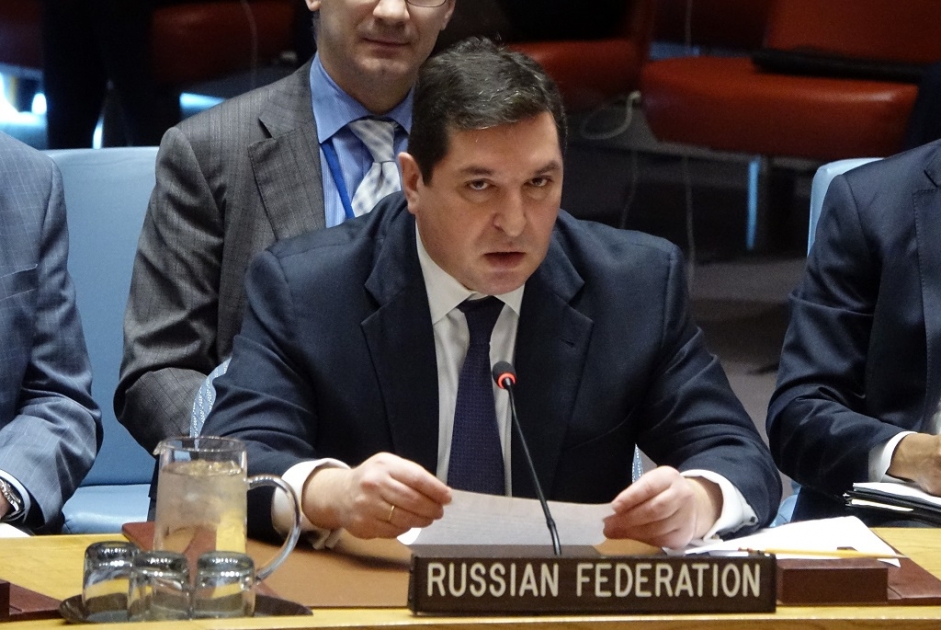Statement by Deputy Permanent Representative of the Russian Federation to the United Nations, Mr. Vladimir Safronkov, at the Secutiry Council meeting after the vote on the resolution to extend the SC mandate for cross-border supplies of humanitarian aid to Syria
When the Security Council established a regime for cross-border supplies of humanitarian aid through the United Nations, we all assumed that it was a temporary emergency measure that perforce infringed on Syria’s sovereignty.
It was introduced in 2014 when the armed conflict was in an acute phase during which at times there was no other way to provide the civilian population with the necessary assistance. It was intended, and as such written into resolution 2165 (2014), that humanitarian supplies transported through specific border crossings would go to residents throughout Syria, a provision that has never been met.
The mechanism mainly serves areas controlled by illegal armed groups that dispose of incoming aid at their discretion. The United Nations has not exercised due control in this area, including of the distribution of humanitarian assistance in Syria. In fact the United Nations agencies do not play the leading role in this plan, which essentially belongs to non-governmental organizations. How and what they are supplying, and to whom, continues to be a mystery wrapped in an enigma. The authorities in Damascus are essentially dealing with a chaotic situation that they are powerless to introduce some order into.
At this point, since our guiding light is first and foremost the interests of the Syrians in need of aid, we have not blocked the latest extension of the transboundary regime. But the proposed text did not take all our priorities into account, so we could not support it. We deplore the unnecessary haste with which resolution 2393 (2017) was adopted. We could have continued the discussions for the sake of reaching a consensus.
We expect the Secretary-General to review the transboundary mechanism within the established time frame with the aim of bringing its activities to their inevitable end. We hope to see recommendations on how to improve its monitoring during the current transitional stage, while the Syrian Government’s opinion must be taken into account without fail. The Secretary-General must also give the Security Council detailed information every month about where the aid is being sent, what it consists of and in what quantities. We hope the reports will not be a formality. We will double-check all the information that the Council receives.
We are grateful to the delegations of Egypt and Sweden for their careful, honest and constructive work. Unfortunately, thanks to the position taken by various Council members that attempts to present the transboundary mechanism as an ideal plan that needs no improvement, and to freeze it as it is indefinitely, some important amendments that we proposed were not included in the final draft. Within the framework of the planned review, we would like to hear from the Secretary-General as to how the effectiveness and transparency of the mechanism could be improved, as well as some details on the partners of the United Nations in this area.
Having given permission for these cross-border shipments, the Security Council has the right to know these things. But it would seem that there is some mystery here involving some kind of carefully guarded extraneous interests. The result is that the people and the sovereignty of Syria suffer, despite the fact that in every resolution we adopt we reaffirm our commitment to those fundamental principles of the Charter of the United Nations.
The situation in the country is radically different now, and the mechanism for cross-border supplies is a remnant of what is past. In our view, it will be important to work to gradually end this rudimentary plan, based on a divided Syria. The United Nations humanitarian agencies should begin to reorient themselves to traditional ways of working in the country in cooperation with its official authorities and in accordance with the universal principles of humanitarian assistance.
We hope that the Secretariat will start making plans for the gradual abandonment of the cross-border shipments. A year from now, the question of whether to extend the mandate of resolution 2165 (2014) will loom.
